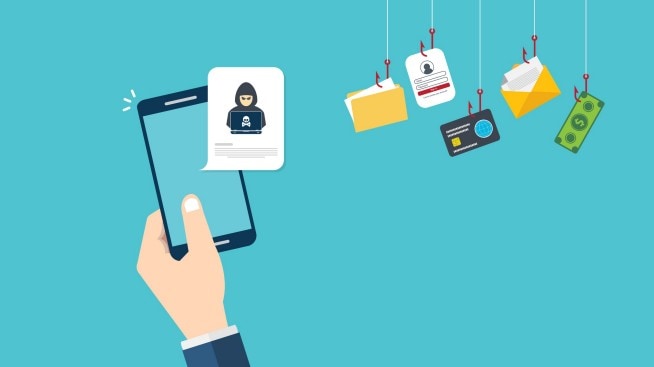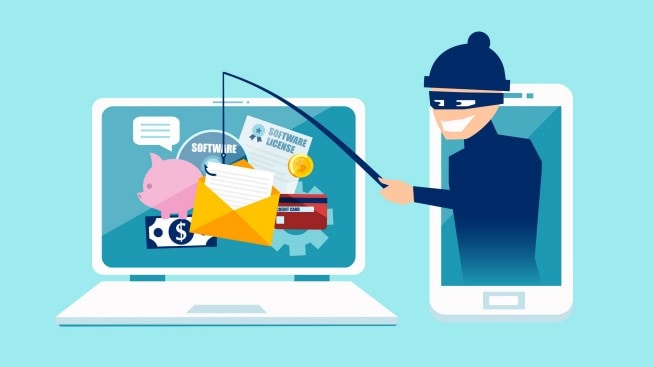Identity theft

How to spot it and keep your information secure
Identity theft is scary. The thought of someone taking out loans or opening credit cards in your name or making large purchases for weeks or even months, can be overwhelming.
Thankfully, there's hope — even if a criminal steals your information. If you know what to watch for and what to do if you've been targeted, you may be able to beat the bad guys and get your credit back on track. Chase Credit Journey® is a tool that might be able to help.
How does identity theft happen?
Identity theft happens when someone steals your personal information in order to commit fraud. A thief might open credit cards or utility accounts. They could get medical treatments in your name. They could also drain your bank account or claim your tax refund. These activities might show up on your credit report, hurt your credit health and make it harder for you to get credit when you need it.
Identity theft can also happen when you lose your wallet or have a piece of mail stolen. Criminals can steal your personal data from unsecured websites, public Wi-Fi networks, email phishing scams and malware.
You've probably heard about hackers stealing customer data from company data breaches. Hackers may obtain customer names, credit card numbers, Social Security numbers and other information. The hackers might use the stolen information themselves or sell it on the dark web.
How can I spot identity theft?
Checking your accounts and credit reports regularly can help you spot identity theft. Always be on the lookout for suspicious activity such as:
- Unusual withdrawals from your bank account.
- Credit card purchases that aren't yours.
- Mail you used to get regularly (like billing statements) that no longer arrives.
- New credit accounts or high balances on your credit report that you don't recognize.
- A letter from the Internal Revenue Service letting you know that they've received more than one tax filing in your name.
Also review all companies you do business with. You could be at a higher risk of identity theft if your info is compromised in a company data breach.
How do I protect myself?
It can feel tough to protect yourself in our high-tech world, but taking some basic precautions can go a long way.
Store your info in a secure place and never share it with anyone:
- Keep your Social Security card, passport and birth certificate somewhere secure.
- Don't share your personal information on social media.
Be cautious with your mail and bills
- Go paperless with your credit card, loan or bank statements.
- Collect your mail every day and put it on hold when you're away.
- Shred receipts, billing statements and other financial paperwork.
Reduce your risks online
- Avoid conducting personal business on public Wi-Fi.
- Use complex passwords.
- Consider installing virus-detection software on your computer.
Stay alert
- Learn more about how to manage your alerts with Chase Credit Journey. We'll notify you if your data is ever leaked or stolen or if someone is trying to use your Social Security number illegally. You'll also get notified whenever there are changes to your overall credit limits, usage and balances.
- Review your bank and credit card statements at least once a month.
- Check your credit report regularly with all three bureaus (Experian™, Transunion® and Equifax®).
What should I do if this happens to me?
Take action quickly if you notice unusual activity or believe someone has stolen your identity:
- Call the company where you believe the fraud happened (this could be your bank or credit card company).
- Call the three main credit bureaus and ask them to place a fraud alert on your credit report.
- Check your credit reports for errors.
- Consider freezing or locking your credit report.
- Change your usernames and passwords.
- Consider reporting the theft to the Federal Trade Commission
Remember that identity theft can happen to anyone. It's important to stay alert, keep your personal information in a safe place and check your credit report regularly.
Key takeaways
- Identity theft can happen if you lose your credit card or other personal documents or if someone hacks websites and companies you rely on.
- Identity theft can hurt your credit health if the thief opens credit cards in your name or uses those accounts to make purchases.
- Keep tabs on your bank account, credit cards and credit report to watch for any suspicious activity.
- Contact your creditors and the credit bureaus immediately if you suspect identity theft.
- We're here to help you monitor your identity. We'll help you restore your credit if your identity may have been stolen.



